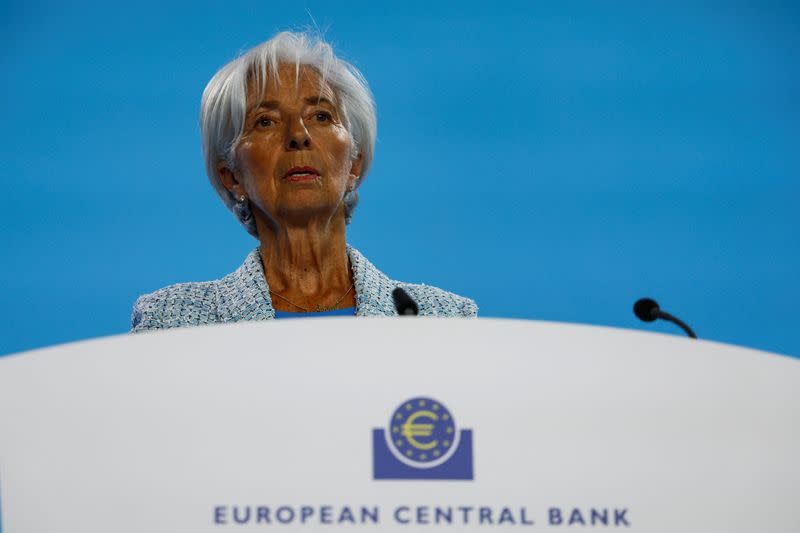Analysis-Lagarde faces tough time 'in charge' of ECB's message

By Francesco Canepa and Balazs Koranyi
FRANKFURT (Reuters) - European Central Bank chief Christine Lagarde wore a necklace with the words "in charge" at Thursday's press conference but her guardedness underlined the difficulty of marshalling consensus when the outlook is murky and policymakers divided.
The ECB had just gone ahead with its first interest rate cut since 2019 despite higher inflation expectations, partly to keep a pledge that many policymakers had made in public after agreeing it behind closed doors.
But the message came with caveats about domestic inflation and wages staying strong, and when Lagarde was asked whether more cuts would follow, she gave an answer that confused some market participants.
Her caution illustrates the challenge facing Lagarde as she tries to maintain unity among the ECB's 26 rate-setters - some of whom regretted committing to Thursday's rate cuts several weeks in advance - and communicate their view.
"Governing Council members are all over the place, they can't agree on the details so she probably had no alternative," said Erik F. Nielsen, UniCredit's chief economics advisor.
The immediate upshot is that the ECB has doubled down on its "data-dependency" mantra: the notion that it will not provide guidance about future policy moves but decide at each meeting based on incoming information.
That is easier said than done with around a dozen national central bank governors and board members airing their opinions and preferences on a near-daily basis, as Lagarde acknowledged on Thursday.
"I'm sure that you will hear some of my excellent colleagues take their view," Lagarde said. "It (the rate-cutting cycle) will 'take such time', or it will 'move at such speed'. I would caution against any such conclusion."
Only hours after the meeting, some policymakers speaking on condition of anonymity said rates would most likely be held steady at the ECB's next meeting in July, with the focus now shifting to September.
DEAL OR NO DEAL
ECB rate-setters agreed to signal as early as their March 7 meeting that a rate cut was likely this month, part of a deal brokered by Lagarde that brought together doves already clamouring for policy easing with hawks calling for caution.
Inflation, after all, had fallen sharply, dropping close to the ECB's 2% target from more than 10% in late 2022 as the economy stabilised after a price squeeze that followed Russia's invasion of Ukraine and the end of the COVID-19 pandemic.
But progress has now stalled and rising wages threaten to push up inflation again, making the ECB's rate cut on Thursday harder to defend and putting a question mark over future moves.
The U.S. Federal Reserve, facing similar "stickiness" in inflation, has already delayed its rate-cutting plans and strong U.S. jobs growth in May is likely to keep them on ice until September at the earliest.
Carsten Brzeski, global head of macro at Dutch bank ING, said the ECB might even have to reverse Thursday's rate cut, just as it did with ill-timed hikes on the eves of the financial crisis in 2008 and sovereign debt crisis in 2011.
"There's a risk the ECB could experience a 'reverse Trichet moment'," Brzeski said, referring to the ECB's then-president Jean-Claude Trichet.
Lagarde was non-committal when asked if the ECB would continue to dial back its steepest-ever sequence of rate hikes, probably reflecting diverging views on the Governing Council.
"Are we today moving into a dialling back phase? I wouldn't volunteer that," she said on Thursday. "Is the dialling back process underway? There's a strong likelihood."
Marco Valli, global head of research at UniCredit, said that message was blurred and Arne Petimezas, an analyst at Dutch broker AFS, described it as confusing.
"I still don't know if she wanted to suggest that the likelihood of additional cuts is low or high or that the ECB will be on hold for a long time," Petimezas wrote.
(Editing by Catherine Evans)

 Yahoo Finance
Yahoo Finance 